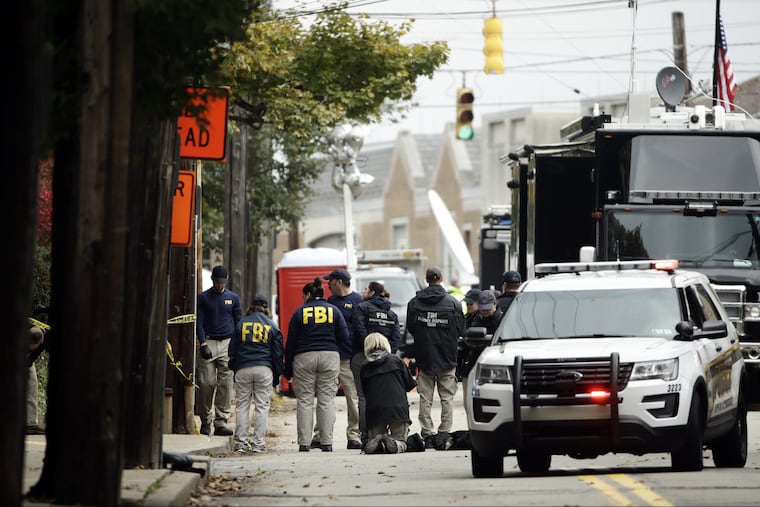What is Gab, the social media network frequented by the Pittsburgh shooter?
What the social media site has amounted to, advocates and observers say, is a haven for white supremacists, neo-Nazis and assorted hatemongers to associate online with little fear of censure.

Traffic on Gab, the social media platform that the suspect in a deadly shooting at a synagogue in Pittsburgh frequented — and where he appeared to post his last missive — is relatively small compared with other social media outlets. But it has outsized influence on the alt-right, the loose compendium of white nationalists, misogynists and fringe trolls whose online — and real-life — presence has been growing since the 2016 election cycle.
Gab was launched in 2016 by Andrew Torba, a former advertising technology CEO from Pennsylvania. Its SEC filings say the company allows anyone to post on its site, which operates similarly to Twitter. But Gab is particularly interested, the filings say, in courting what the company calls an "underserved" segment of the population: "conservative, libertarian, nationalist, and populist internet users" fed up with mainstream social media networks censoring "conservative views."
What this has amounted to in practice, advocates and observers say, is a haven for white supremacists, neo-Nazis, and assorted hate-mongers to associate online with little fear of censure.
"When I think about Gab being an extremist platform, I think about that in its essence, and part of the reason for its founding," said Keegan Hankes, a senior research analyst for the Southern Poverty Law Center's intelligence project. "Gab rose up out of a lot of the major social media companies taking a firmer stance on [hateful speech]. Gab allowed people to hold on to notoriety. That's why it was important."
Should you lose your Twitter or Facebook account over offensive content, Hankes said, "it was like a backup in some way."
For Robert Bowers, 46, who was charged in the shooting at Pittsburgh's Tree of Life synagogue, which killed 11 and wounded six, Gab was a place to post vile epithets against Jewish people — and where he apparently signed off before entering the synagogue with an AR-15 rifle.
"HIAS likes to bring invaders in that kill our people," he wrote, in a reference to the Jewish refugee resettlement agency. "I can't sit by and watch my people get slaughtered. Screw your optics, I'm going in."
Gab's policies prohibit "acts of violence against others, promoting or engaging in self-harm, and/or acts of cruelty, threatening language or behavior that clearly, directly and incontrovertibly infringes on the safety of another user or individual(s)," according to a statement released by the company following the shooting.
Still, the Pittsburgh Post-Gazette reported that the company argued in a 2017 lawsuit against Google that while other social networks have tried to contain or limit hate speech, "Gab believes that 'hate speech' is just 'a particular point of view.'"
For a time, Torba apparently operated Gab out of a WeWork coworking space in an office building at 19th and Market Streets in Philadelphia. The company's SEC filings as recently as March were listing "1900 Market St." as its address. A WeWork spokesperson said in an email that Torba had become a member at the coworking space under his own name, not Gab's name, and that his time at the space was brief. They declined to comment further on WeWork's backgrounding policies.
Brandywine Realty Trust, which owns the building at 1900 Market Street, said they had never leased space to the company, and that Gab had used desk space at WeWork for a month, between March and April of this year.
A Gab spokesperson wrote in an email that the company is no longer based in Philadelphia and declined further comment, referring a reporter to a statement about the Pittsburgh shooting that was almost identical to the message it wrote following the Charlottesville attack more than a year ago.
Torba graduated from the University of Scranton and moved to Philadelphia shortly afterward, where he launched a social media marketing app called Kuhkoon that later became known as Automate Ads, according to TechCrunch. He was later admitted to the prestigious start-up accelerator Y Combinator on the strength of that app, but was later ousted from the group's alumni network after members said Torba, an outspoken Trump supporter, had spoken in a "threatening, harassing way" toward them after the 2016 election, BuzzFeed reported.
The company and its users were in damage-control mode over the weekend, with Torba initially telling followers that the site had lost its host and that major sites such as PayPal were cutting ties with Gab, even as Torba bragged the site was seeing some of its highest-ever traffic after the shooting. By Sunday afternoon, Torba posted that the site had found a new host and was extolling the virtues of promoting free speech despite attempts to remove Gab's platform for it. Then later Sunday night, Gab.com tweeted about another threatened suspension of its domain.
Free-speech arguments fall flat for advocates who track the extreme right.
"These are the guys that will sit there and talk about free speech this, or free speech that, until someone else that they don't like also uses their free speech. They have their freedom of speech — no one is arguing that. What they are also looking for is freedom of consequence. They're not going to have that," said Daryle Lamont Jenkins, a longtime anti-fascist activist in Philadelphia who runs a website tracking right-wing extremists.
"You have to fight these guys," Jenkins said. "You have to make sure that they have no quarter whatsoever anywhere — and that's where the de-platforming comes in, and that's where the de-financing comes in."